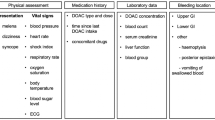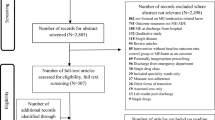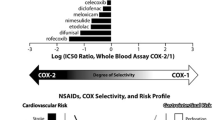Abstract
Background The rate of gastrointestinal (GI) complications with non-steroidal antiinflammatory drugs (NSAIDs) or low-dose aspirin (LD-ASA) varies according to risk factors. For at risk patients, the Italian regulatory resolution enforce prophylaxis with proton pump inhibitors (PPIs) or misoprostol. Objective This study evaluated the consistency with such resolution in patients receiving NSAIDs or LD-ASA and assessed whether patients continued to receive GI protection with PPIs for an adequate time following NSAID discontinuation. Setting An observational retrospective study was conducted using data from Health District of Pisa. Methods The analysis was performed on patients receiving prescription of NSAIDs or LD-ASA, with or without concomitant PPIs or misoprostol, accordingly with the presence of risk factors (2008–2010). Prescription data were retrieved from the database of reimbursement claims for dispensed drugs, while history of past GI diseases was obtained from primary or secondary discharge diagnosis. Main outcome measure The consistency rates of PPI and misoprostol prescriptions with Italian regulatory rules in patients receiving chronic NSAIDs or LD-ASA. Results 6869 patients, receiving NSAIDs or LD-ASA during the observation period, were eligible for the analysis. For NSAIDs or LD-ASA, gastroprotection rates in patients without risk factors were: 8 and 6 % in 2008; 10 and 8 % in 2009; 9 and 6 % in 2010; while the proportions of patients with one or more risk factors not receiving gastroprotection were: 12 and 17 % in 2008; 25 and 22 % in 2009; 15 and 17 % in 2010. In patients discontinuing chronic NSAIDs, 62 % were maintained on protection with PPIs, but only 28 % continued the PPI treatment for an adequate time (60 ± 7 days). Conclusions The present analysis, although restricted to prescription patterns in a single health district, suggests scarce levels of consistency with Italian regulatory resolution on the prophylaxis of GI adverse events associated with chronic NSAIDs or LDASA.

Similar content being viewed by others
References
Adebajo A. Non-steroidal anti-inflammatory drugs for the treatment of pain and immobility-associated osteoarthritis: consensus guidance for primary care. BMC Fam Pract. 2012;13:23.
Scarpignato C, Hunt RH. Non-steroidal anti-inflammatory drug-related injury to the gastrointestinal tract: clinical picture, pathogenesis, and prevention. Gastroenterol Clin N Am. 2010;39(3):433–64.
Straube S, Tramer MR, Moore RA, Derry S, McQuay HJ. Mortality with upper gastrointestinal bleeding and perforation: effects of time and NSAID use. BMC Gastroenterol. 2009;9:41.
Lai KC, Lam SK, Chu KM, et al. Lansoprazole for the prevention of recurrences of ulcer complications from long-term low-dose aspirin use. N Engl J Med. 2002;346(26):2033–8.
Lanas A, Ferrandez A. Inappropriate prevention of NSAID-induced gastrointestinal events among long-term users in the elderly. Drugs Aging. 2007;24(2):121–31.
Lanas A, Garcia Rodriguez LA, Arroyo MT, et al. Risk of upper gastrointestinal ulcer bleeding associated with selective cyclo-oxygenase-2-inhibitors, traditional non-aspirin, non-steroidal anti-inflammatory drugs, aspirin and combinations. Gut. 2006;55(12):1731–8.
Rostom A, Wells G, Tugwell P, et al. The prevention of chronic NSAID induced upper gastrointestinal toxicity: a Cochrane collaboration metaanalysis of randomized controlled trials. J Rheumatol. 2000;27(9):2203–14.
Moore RA, Derry S, Simon LS, Emery P. Nonsteroidal anti-inflammatory drugs, gastroprotection, and benefit-risk. Pain Pract. 2014;14(4):378–95.
Corleto VD, Festa S, Di Giulio E, Annibale B. Proton pump inhibitor therapy and potential long-term harm. Curr Opin Endocrinol Diabetes Obes. 2014;21(1):3–8.
Chan FK, Graham DY. Prevention of non-steroidal anti-inflammatory drug gastrointestinal complications-review and recommendations based on risk assessment. Aliment Pharmacol Ther. 2004;19(10):1051–61.
Scott SA, OwusuObeng A, Hulot JS. Antiplatelet drug interactions with proton pump inhibitors. Expert Opin Drug Metab Toxicol. 2014;10(2):175–89.
Kwok CS, Loke YK. Meta-analysis: the effects of proton pump inhibitors on cardiovascular events and mortality in patients receiving clopidogrel. Aliment Pharmacol Ther. 2010;31(8):810–23.
Charlot M, et al. Proton pump inhibitors are associated with increased cardiovascular risk independent of clopidogrel use: a nationwide cohort study. Ann Intern Med. 2010;153(6):378–86.
Scheiman JM. Prevention of NSAID-Induced Ulcers. Curr Treat Options Gastroenterol. 2008;11(2):125–34.
Graham DY, Agrawal NM, Campbell DR, NSAID-Associated Gastric Ulcer Prevention Study Group, et al. Ulcer prevention in long-term users of nonsteroidal anti-inflammatory drugs: results of a double-blind, randomized, multicenter, active- and placebo-controlled study of misoprostol versus lansoprazole. Arch Intern Med. 2002;162(2):169–75.
Sturkenboom MCL, Burke TA, Tangelder MJ, et al. Adherence to proton pump inhibitors or H2-receptor antagonists during the use of non-steroidal anti-inflammatory drugs. Aliment Pharmacol Ther. 2003;18(11–12):1137–47.
Hunt RH, Barkun AN, Baron D, et al. Recommendations for the appropriate use of anti-inflammatory drugs in the era of the coxibs: defining the role of gastroprotective agents. Can J Gastroenterol. 2002;16(4):231–40.
AIFA. Determinazione AIFA, 11 febbraio 2008—www.agenziafarmaco.gov.it. 2008. Last accessed 01 Sept 2015.
Reid M, Keniston A, Heller JC, et al. Inappropriate prescribing of proton pump inhibitors in hospitalized patients. J Hosp Med. 2012;7(5):421–5.
Murthy SK, Kauldher S, Targownik LE. Physicians’ approaches to the use of gastroprotective strategies in low-risk non-steroidal anti-inflammatory drug users. Aliment Pharmacol Ther. 2006;23(9):1365–72.
Morini S, Zullo A, Oliveti D, et al. A very high rate of inappropriate use of gastroprotection for non steroidal anti-inflammatory drug therapy in primary care: a cross-sectional study. J Clin Gastroenterol. 2011;45(9):780–4.
Helsper CW, Smeets HM, Numans ME, et al. Trends and determinants of adequate gastroprotection in patients chronically using NSAIDs. Pharmacoepidemiol Drug Saf. 2009;18(9):800–6.
Van Soest EM, Sturkenboom MC, Dieleman JP, et al. Adherence to gastroprotection and the risk of NSAID-related upper gastrointestinal ulcers and haemorrhage. Aliment Pharmacol Ther. 2007;26(2):265–75.
Abraham NS, Hartman C, Castillo D, Richardson P, Smalley W. Effectiveness of national provider prescription of PPI gastroprotection among elderly NSAID users. Am J Gastroenterol. 2008;103(2):323–32.
Pasina L, Nobili A, Tettamanti M, et al. Prevalence and appropriateness of drug prescriptions for peptic ulcer and gastro-esophageal reflux disease in a cohort of hospitalized elderly. Eur J Intern Med. 2011;22(2):205–10.
World Health Organization. International classification of disease: injuries and causes of death. Ninth Revision (ICD-9). Geneva: World Health Organization; 1987.
AIFA. Determinazione AIFA, 22 settembre 2009—www.agenziafarmaco.gov.it. 2009. Last accessed 01 Sept 2015.
Scarpignato C, Pelosini I. Prevention and treatment of non-steroidal anti-inflammatory drug-induced gastro-duodenal damage: rationale for the use of antisecretory compounds. Ital J Gastroenterol Hepatol. 1999;31(Suppl 1):S63–72.
MacDonald TM, Morant SV, Robinson GC, et al. Association of upper gastrointestinal toxicity of non-steroidal anti-inflammatory drugs with continued exposure: cohort study. BMJ. 1997;315(7119):1333–7.
Graham DY. Critical effect of Helicobacter pylori infection on the effectiveness of omeprazole for prevention of gastric or duodenal ulcers among chronic NSAID users. Helicobacter. 2002;7(1):1–8.
Lanas A. Advances in gastrointestinal disorders associated with non-steroidal antiinflammatory agents and aspirin. Gastroenterol Hepatol. 2011;34(Suppl 2):36–42.
Ntaios G, Chatzinnikolaou A, Kaiafa G. Evaluation of use of proton pump inhibitors in Greece. Eur J Intern Med. 2009;20(2):171–3.
OsMed working group. The use of drugs in Italy. National Report 2010. Rome: Il Pensiero Scientifico Editore. www.agenziafarmaco.gov.it/it/content/osmed-report. Last accessed 01 Sept 2015.
Author information
Authors and Affiliations
Corresponding author
Ethics declarations
Funding
This research did not receive specific funding.
Conflicts of interest
No conflicts of interest to declare.
Rights and permissions
About this article
Cite this article
Montagnani, S., Tuccori, M., Testi, A. et al. Adherence with regulatory resolutions on prevention of NSAIDs-related gastrointestinal injury in Italy. Int J Clin Pharm 38, 829–837 (2016). https://doi.org/10.1007/s11096-016-0291-8
Received:
Accepted:
Published:
Issue Date:
DOI: https://doi.org/10.1007/s11096-016-0291-8




